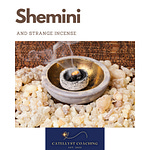This week we are studying Parashat Tazria (Leviticus 12:1 - 13:59). We learn a few things about rest and recovery from childbirth or illness in this week’s parsha. Let’s have a look!
Tazria Aliyot Summary
The Torah teaches us about a timeframe, during which a woman is considered impure, after childbirth, and the obligation of circumcision. The Torah also instructs us about the laws of tzara'at - white skin discolorations.
The Torah teaches us about the process of being declared clean or unclean by the Kohen after a period of quarantine. Was this for the safety of the rest of the camp, or an ancient “medical system?”
We learn the laws of tzara'at which appears following an inflammation on the skin.
We learn the laws of tzara'at which appears following a burn to the skin.
We learn that areas of the body covered in hair can also be affected by tzara'at.
We learn that tzara'at can appear on bald spots as well as clothing! The Torah then teaches us about a clothing tzara'at - which made me wonder if this was a form of mold or something that can grow on the fibers of fabric.
After the quarantine period, depending on the circumstances the garment is either declared pure, or completely burnt, or only the part which was discolored is torn out and burnt. This decision is made by the Kohen.
Parenting Touchpoint:
I feel like the judgment we assign to the period of “quarantine” after childbirth has a lot to do with how we experience that time. If we tell moms that she is impure and cannot be near us, we are inflicting a feeling of isolation and shame on her. But, if we reframe it as a period of rest, and a beautiful time to turn away from her other responsibilities (like work, cooking, caring for other children, or even attending to the needs of her husband) and turn her attention to rest, and bonding with her new baby, then it feels very different. I sense the harsh language was used because the target audience was the men in the culture, hopefully hinting to them to leave her alone and let her rest and recover! LOL
Ancient Near Eastern cultures conflated morality with health. While I do believe we are three-dimensional beings, and need to tend to the spiritual, physical, and emotional needs of ourselves and our children, I don’t think we get “punished” by G-d with sickness for our moral ineptitude. On the other hand, if we ARE gossipping, we may likely be anxious as well, and that feeling could be causing inflammation in our tissues.
My main takeaway from this is to consistently cultivate a relationship pattern with my children that makes open, honest communication safe and welcomed. This can be very difficult, especially when we hear bad news, or we are alarmed at some of the things our children want to tell us…but if they WANT to tell us, that is a really good sign our relationship is secure.
Feel free to share your thoughts in the comments below!
May the G-d of Abraham, Isaac, and Jacob bless you with rest when you need it! Parenting is a lifelong marathon. Take good care of yourselves! Until next time, Shalom!
This work is provided by the generous support of listeners. If you are enjoying this podcast, please help us out by sharing it with another parent!
If wish to support this podcast financially, you can donate here:
During this podcast, listeners were invited to learn more about their child’s Human Design at www.sashyaclark.com
Also, check out my newest Substack: AlongtheWay613, a 5-15 minute study session that curates Primary Jewish Sources, a brief D’var Torah, and Discussion Prompts empowering Jewish parents to discuss the Torah “Along the Way” (during the morning carpool, over breakfast, or while you are cooking dinner together).













Share this post